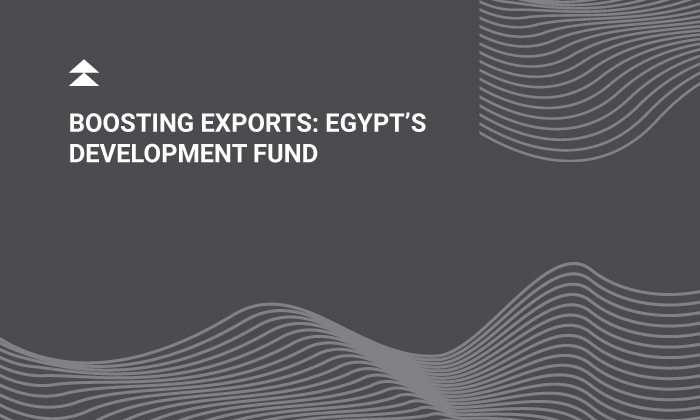Egypt has long diagnosed the importance of encouraging exports and supporting commercial sectors including furniture, textiles, scientific supplies, chemical substances, cosmetics, and engineering industries. To obtain this, the authorities set up the Export Development Support Fund under Law No. A hundred and fifty five of 2002. The Fund operates beneath the Ministry of Trade and Industry and plays a central position in expanding Egypt’s exports, strengthening the economy, and helping the dreams of Vision 2030.
Objectives of the Fund
- Encourage the unfold of Egyptian products in foreign markets.
- Provide technical and advertising and marketing assistance, consisting of research centers and laboratories.
- Develop virtual networks with importing markets and export corporations.
- Reduce financial burdens on exporters and sell truthful competition.
- Support exporters’ advertising and promotional talents.
Eligibility and Requirements
- Companies should prove at least 40% neighborhood fee-delivered in their products.
- Exporters ought to maintain legitimate pleasant certificates registered with the Egyptian Organization for Standardization and Quality.
- Small, medium, and huge groups can all check in, with extra incentives for smaller enterprises.
Documentation and Support Mechanisms
Exporters are required to offer vital files consisting of business and business registers, tax playing cards, best certificates, stability sheets, and licensed export certificates. Support is distributed in 3 forms: coins (40%), dues with the Ministry of Finance (30%), and infrastructure credits (30%). Small exporters (below $1 million annually) acquire a further 2% subsidy, even as medium exporters get hold of 1%. Free zone companies gain from 50% of the same old help rate.
Achievements and Impact
Between 2019 and 2023, more than 2300 companies benefited from the initiative, which led to support from more than 54 billion EGP. The program has promoted national income, improved currency reserves and reinforced Egyptian status in international markets.
Despite the achievements, the Export Development Assistance program faces many challenges. The compliance with global competition, logistics barriers and international standards continues to influence Egyptian exporters. The government has responded by promoting digital change, modernization of infrastructure and streamlining customs processes.
Key Challenges and Reforms
- Global competition: Egyptian products compete with low costs and high-quality international goods. Investment in innovation and advanced production technology helps to address it.
- Logistics: High transport costs and port delays are obstacles. The purpose of the new infrastructure projects and electronically adapted clearance systems is to reduce these problems.
- Compliance with standards: International markets require high quality and environmental standards. Export is necessary quickly to obtain ISO and other certificates.
Broader Economic Impact
The program not only increases exports but also diversifies Egypt’s economy. Beyond textiles and agriculture, industries such as engineering, chemicals, and medical supplies are becoming central to export growth.
This diversification strengthens resilience against global economic shocks.
Practical Outcomes
- Furniture and textile industries have expanded into African and European markets.
- Handicraft exporters gained access to new markets through simplified procedures.
- Job creation has increased as local industries are integrated into global supply chains.
Future Outlook
In line with Vision 2030, the following steps of the Export Support Initiative will be aimed at digital trade, expanding to African free trade locations and promoting industries that are environmentally friendly. These measures will make Egypt much stronger in terms of competitiveness and sustainable economic development.
Partnership between the Government and the Private Sector.
The collaboration between the government and individual exporters is a great determinant of the success of the Export Development Support Program in Egypt. Whereas the government offers the legal, funding and infrastructure provision, the private sector offers innovation, product development, and market expansion strategies. Joint trade fairs, international exhibitions and public- private partnerships are now indispensable in marketing Egyptian products at the international level.
Integration with International Trade Agreements
Egypt is part of several regional and international agreements that increase export opportunities. For example:
- COMESA (Common Market for Eastern and Southern Africa): Grants Egyptian exporters access to a large African market with reduced tariffs.
- AFCFTA (African Continental Free Trade Agreement): Expands trade opportunities within Africa and helps Egyptian products compete regionally.
- EU Partnership Agreements: Provide access to European markets, especially for textiles, agricultural products, and processed food.
The Export Development Fund complements these agreements by ensuring Egyptian companies can meet international requirements and take advantage of preferential trade terms.
Future Challenges and Recommendations
- Diversification of markets: Egypt still depends a lot on some areas. Expansion of exports in Latin America and East Asia can reduce the risk.
- Permanent exports: Global trends move towards green and environmentally friendly products. Egypt should encourage industries to use renewable energy and environmentally friendly practice.
- Capacity building: More exercise programs are required for exporters, especially small and medium -sized companies (SMB), to improve knowledge of international trade rules and digital marketing.
- Financial innovation: Development of new financial instruments such as export credit insurance and low loans will reduce financial pressure on exporters.
- Technology and digital change: The government should expand the e-platform for export registration, customs withdrawal and dismissal of customs duties and grants, making the system quickly and more transparent.
Extensive social and economic benefits
The effect of the program is outside the business. By increasing exports, Egypt improves the degree of employment, increases currency reserves and strengthens its global economic status. Export growth also leads to regional development, as many industries are based outside Cairo and Alexandria, which spread profits throughout the country.
This article offers a general overview of the subject matter and is not a substitute for legal advice. For guidance tailored to your specific circumstances, professional consultation is recommended.
If you choose us to support your specific issue, please do not hesitate to contact us using Inquiries Form (link) or by sending an email to coop@youssrysaleh.com.
